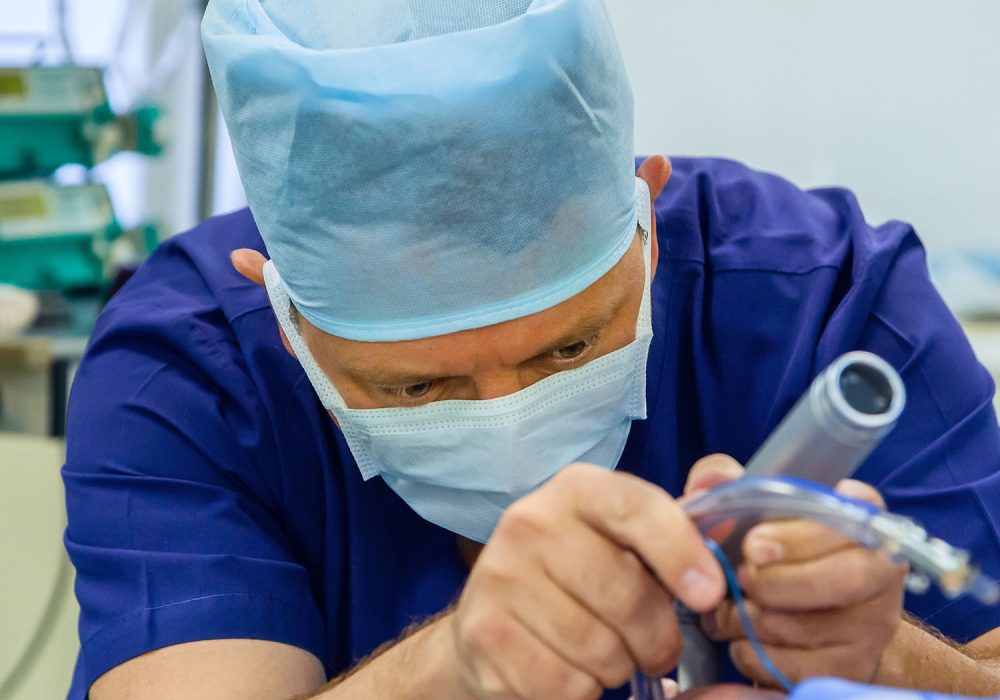Intubation At-A-Glance: What It Is, Why It’s Necessary & What to Expect
From “asymptomatic” to “ventilators”, COVID-19 has brought some new words into the daily vocabulary of Americans everywhere. One of the most common new additions to our lexicon? Intubation. Today, then, we wanted to offer up everything patients need to know about intubation—including what it is, why it might be necessary, and what you can expect from intubation during your procedure.
Before we dig in…
While there are all different types of intubation, today we’re discussing tracheal intubation, which is the most common kind of intubation and is often just referred to as “intubation”.
What is intubation?
Tracheal intubation is the process where a medical professional inserts a flexible plastic tube (called an endotracheal tube or “ET”) through a patient’s mouth and down into her airway. The tube is then connected to a ventilator (yet another COVID-19 vocab word), a machine that mechanically moves breathable air into and out of the lungs.
Why is intubation necessary?
When a patient can’t maintain her own airway or can’t breathe on her own, tracheal intubation is the solution. This can occur during sedation (i.e. when you’re given anesthesia during a procedure and can’t breathe on your own) or as a result of a severe illness (i.e. a COVID-19 patient who can’t get enough oxygen to her lungs on her own).
Why am I suddenly hearing about intubation in the world of Coronavirus?
COVID-19 is an acute respiratory disorder that can cause your lungs to fail. When it attacks the cells in your lungs and throat, it makes it hard for your lungs to perform their basic function. Because of this, many Covid patients can’t breathe on their own and will require being intubated and put on a ventilator (the machine that does your lungs’ job of breathing for them).
Why is intubation given during surgery?
Even if you’re not suffering from COVID-19 or another illness that can make breathing on your own difficult, if you’re undergoing general anesthesia, tracheal intubation is required. This is because general anesthesia makes it impossible for you to breathe on your own by paralyzing the muscles in your body, including your diaphragm (the large muscle at the base of your lungs that plays a critical role in moving oxygen in and out of the body). Keep in mind—being intubated during surgery is necessary, common, and planned for with scheduled procedures; whereas being intubated due to an illness like COVID-19 is often an emergency intervention.
Will I wake up from surgery with the breathing tube in?
In most cases, patients are extubated (i.e. the tube is removed) before they ever wake up from general anesthesia. If you’re having trouble breathing on your own or are extremely ill, you may remain on the ventilator for an extended period of time, but this is rare. Typically, you will wake up from surgery without the ET in and should be able to breathe on your own just fine.
Are there any risks of being intubated?
Tracheal intubation during surgery is very low risk, but there are certain issues that may arise. According to Verywell Health, these include:
- Accidental intubation in the esophagus (food tube) instead of the trachea (air tube)
- Trauma to the teeth, mouth, tongue, and/or larynx
- Trauma to the trachea
- Bleeding
- Inability to be weaned from the ventilator, which requires a tracheostomy
- Aspirating (inhaling) vomit, saliva, or other fluids while intubated
- Pneumonia, if aspiration occurs
- Sore throat
- Hoarseness
- Erosion of soft tissue (might occur with prolonged intubation)
What should I ask my doctor about intubation?
If you’re concerned about intubation during surgery, have an open conversation with your surgeon about your concerns and the risks of being intubated. Some things you might consider asking, include:
- What type of anesthesia will I be given for my procedure?
- Will I need to be intubated during my procedure?
- Who will intubate me?
- How long will I remain intubated?
- Are there any preexisting conditions that might mean I’m at a higher risk of needing to remain intubated after the procedure?
- Will I have any side effects from the intubation?
Should I be worried about intubation during my procedure?
The thought of having a tube in your airway and being connected to a machine that’s helping you breathe can be a frightening one, we know—but remember, intubation during general anesthesia is not only common, it’s necessary. In most cases, you won’t even know it’s happened, and you likely won’t experience any major side effects upon waking up from your procedure.
Try not to let your mind focus too much on what things will be like while you’re under general anesthesia and, instead, shift your focus to what you can do to get strong and healthy before surgery and the steps you can implement after surgery to make your recovery seamless!
Want even more insightful surgery information? Browse the rest of our blog for empowering pre-op tips, helpful nutrition advice, and more!


